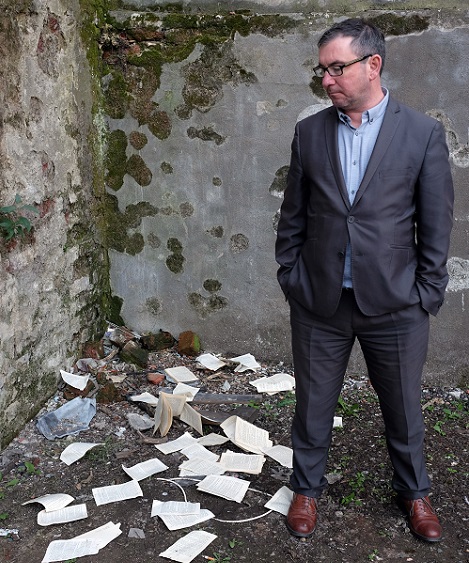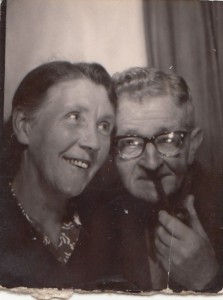I met Martin Mooney in August ’95 at The Poet’s House (where he was a faculty member) in Portmuck, on the Antrim coast in the northwest of Ireland. I have memories of musty mornings in damp stonewalled cottages without electricity, stormy days filled with writing and workshops, dark evenings of readings and raucous conversation, and scandalous nights best forgotten.
Somewhere amidst all of this he signed my copy of Grub (Blackstaff Press), his first collection. A remarkable book of poetry that had burst out into the world in 1993 – winner of the Brendan Behan Memorial Award, nominated for the Forward Prize, shortlisted for the Rooney Prize for Irish literature, and a Poetry Book Society Recommendation to boot – socially aware poems of shipyards, pubs, punks, and politics.
A few years later, as an occasional reviewer for Poetry Ireland Review, his chapbook Bonfire Makers (Dedalus Press) landed on my doorstep. I can feel the brunt of its words yet – “Picture yourself drinking with your father,/the talk collapsing down through itself like/badly-erected staging. You are both/on the verge of drunk, and everything/is either forgiven or forgotten” (Painting the Angel) or “It’s no fucking metaphor,/The stuff comes in hundredweight/drums, like dehydrated rage,/a bad temper you could add to water” (Caustic).
“Martin Mooney is a poetic force to be reckoned with,” I wrote, and later on in the same review, “In a world filling ever increasingly with bad poetry, Mooney is a godsend.” He sent me a note of appreciation some time afterwards, but as an atheist apparently had some reservations about being a ‘godsend’!
The fragments below are a departure, prose fragments from a book in progress – snatches of memory – or as he himself says, “For me, remembering is like looking out of the window of a ferry in a heavy chop – just random slashes of sea, sky, coastline.”
— Gerard Beirne
I have a terrible memory. The past is fits and starts, jump-cuts, snatches of sights and sounds too trivial to be called epiphanies. ‘Moorfield Street’ is an attempt to gather together some of these fragmentary episodes into some kind of autobiographical order. As a document it falls far short of memoir, and if it is poetry I’d be the first to admit it struggles to attain that condition. And it avoids narrative connectedness, because I can’t help suspecting that narrative connectedness could only be – given my terrible memory – confabulation. Not of course that there aren’t confabulations in here still.
But by way of narrative background, or context: Moorfield Street in east Belfast is where my maternal grandparents James and Isabella Kirkpatrick lived, from the 1940s until my widowed grandmother moved to a sheltered housing complex. My parents had their troubles, and I spent a lot of time during my childhood in the Kirkpatricks’ Victorian terraced house. I remember it as another kind of sheltered dwelling, a safe house and bolt-hole, and it feels good to renew acquaintance with that security.
There is also, in middle age, the realisation that what one remembers of childhood is now historical. The house in Moorfield Street is still there, modernised with parquet floors and indoor bathroom. But the world of the 1960s and 70s – which in east Belfast was still the postwar world – has been dissolved in the annotations of local historians. These texts are a species of precipitate.
—Martin Mooney
Fragment
I envy your memory, the way you recognise people on the street and know their names, the way you can correct me so confidently. For me, remembering is like looking out of the window of a ferry in a heavy chop – just random slashes of sea, sky, coastline – or trying to watch something through binoculars, magnifying and multiplying every blink of the eye, every shake of the hand, every twitching muscle in my forearm.
.
Moorfield Street
At the turn of the stairs in Moorfield Street there was a window onto the back yard. The glass was old, uneven, with that gel-like pooling towards the bottom of the frame. Around the edge of the window, smaller frames in coloured glass. Sometimes I’d sit quietly on the top stair of that flight and watch sunlight take colour on the old wallpaper, moving its oblongs of red, blue, green as the morning passed.
The house was louder with clocks than any I’ve known before or since. The coal fire – we had gas – crackled and spat in the grate, and individual lumps of coal hissed out tiny plumes of smoke. A Swan Vesta would crackle, dottle bubble in my granda’s pipe stem. When he spat into the fire, phlegm sizzled on firebrick.
.
The Bridge
With Granny Kirkpatrick on the up line platform on Sydenham halt. It must be late July or August, there’s the high summer smell of oil shimmering on the gravel track bed, of the putrid black mud of nearby Connswater. She is holding my hand. We have to cross to the other platform to catch the train that will take us a few miles to Holywood where we can sit on the tiny beach and watch the ships come into the port of Belfast. At the far end of the platform, the iron footbridge seems to buckle slightly in the heat haze, then pull itself together. All of a sudden – I don’t remember hearing thunder – the bridge is struck by lightning and glows faintly blue. We stare, then walk on and tentatively cross.
.
Sounding Moorfield Street
Factory sirens in the morning and afternoon. My post-war ears hear warning and all-clear, howling over the rooftops. Early on, before I am up but long after Granda Kirkpatrick, the whirr and chime of the Co-op electric milk float. The Maine man’s lorry, heavier lemonade bottles clanking in their crates. A short run through the entry, the electricity sub-station hums behind its bars. I know I could squeeze between them, but the steel and smoothly-moulded ceramics of the Frankenstein apparatus frighten me. A Skyvan’s twin-engined throb. Incongruous chickens cockadoodldoing somewhere nearby.
.
Flora
From Moyard to Newtownards, my father’s home town. Ian and I spent the night in a big bed in Granny Mooney’s house, shared with aunts and uncles not much older than ourselves. Next day we moved into the new house on the new – the still-unfinished – estate on the slopes above the town. This had been pasture, hazel and holly woodland, and the roads and avenues were named after the flora torn up by the builders. Whin. Juniper. Ilex.
.
Does He Know?
Granny Kirkpatrick: Does he know?
Mum: Does he know what?
Granny Kirkpatrick: Does he know?
Mum: What, Mai?
Granny Kirkpatrick: About his Daddy?
Mum: What about his Daddy?
Granny Kirkpatrick: You know what.
Mum: What?
Granny Kirkpatrick: That he’s RC?
Mum: Oh for God’s sake!
.
What We Ate
Egg boiled and beaten in a cup with butter and salt. Lentil soup with the heel of a plain loaf dipped in. Toast made on the gas ring. Boiled potatoes served with butter and salt. Stewed beef from a tin. Fray Bentos pies with layers of damp flaccid suet pastry under the dry crisp flaky pastry top. Cheese triangles. Chops and sausages. Shepherd’s pie. And what I wouldn’t eat: onions, tomatoes, baked beans, peas.
And later, Toast Toppers. Cremola Foam. Chicken Tonight. Soda Stream. Birds Eye steakettes. Oven chips. Vesta beef risotto. The microwave. Frozen stir-fry. Crispy Pancakes filled with a volcanic paste of mushroom and minced beef or poultry fragments, blistering the roof of my mouth.
.
Hallowe’en
The bin lid was upturned and set back in the mouth of the galvanised dustbin. Newspaper was crumpled, sticks for lighting the fire put on. A bonefire for Hallaseve. We had sparklers, false-faces, a box of Bengal matches. Bully Martin. Bully Ian.
.
Wall
As if he lives in a fortress, as if he feels himself under siege, Granda Kirkpatrick has cemented pieces of glass into the top of the back yard wall. They are the bottoms of bottles, different shapes and sizes, shark’s-fins of different coloured glass catching the light. The smoky glass of a milk bottle, the brown of beer bottles, the vivid blue fang of Milk of Magnesia.
.
Glossary
To dress in the morning was to get on you, and to undress for bed was to get off you. If it was cold I kept my simmit on. In the toilet, to pee was to wee-wee – boys used their wee man – and a turd was a loadie. When she was upset or sad Granny Kirkpatrick would sigh something that sounded like ‘lawnie days.’ When I was upset or sad they told me to straighten my face. My feet were kebs, my ears lugs, if I swallowed Bazooka Joe bubble gum it would stick in my puddings. A splinter under the skin was a skelf, to be dug out with a sewing needle or it would fester.
—Martin Mooney
.
Martin Mooney is the author of four collections of poetry – most recently The Resurrection of the Body at Killysuggen (Lagan Press, 2011). He was born in Belfast and has worked as a civil servant, creative writing teacher, arts administrator and publican. As well as writing poetry, he has collaborated with visual artists on a number of site-specific projects, and with composer Ian Wilson on ‘Near the Western Necropolis’ for mezzo soprano and chamber orchestra.
Eyewear magazine recently called Mooney ‘…one of the best Irish poets writing under the age of 50.’ And according to Sinead Morrissey, ‘Gritty, disturbing, often uncomfortable, terse, controlled, aggressive, lyrical, Martin Mooney, at his best, extends the boundaries of what is and is not appropriate subject matter for poetry.’


